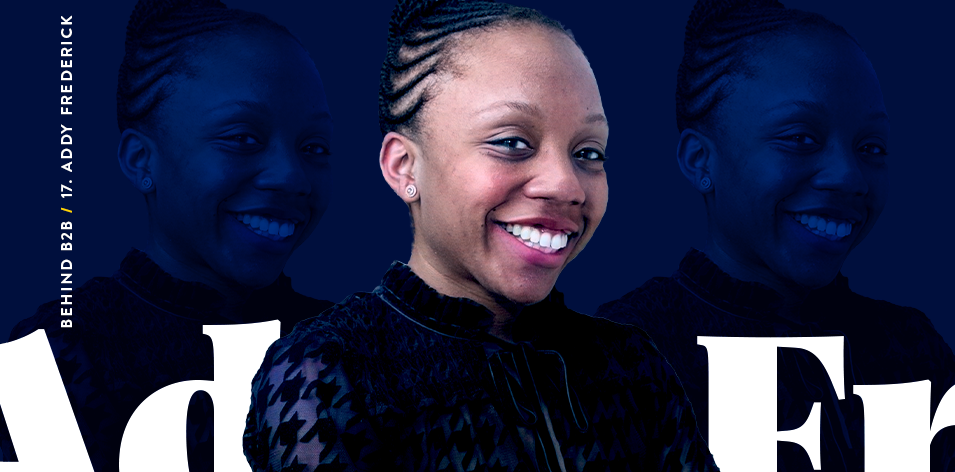

For the 16th instalment of Behind B2B, our series exploring the brightest minds in the industry, we meet award-winning comms specialist Addy Frederick.
Much like our previous Behind B2B interviewees, Addy didn’t always know what she wanted to do. From a Classics degree at King’s College to PR at the Edinburgh Fringe, Addy went on to forge a career in comms, working with the likes of LV, Barclays, and Bupa. Now Head of Group Communications at Admiral Group plc, we sat down to discuss her experiences, the stories she’s most proud of telling – and whether or not we should all be on TikTok.
Everyone at my school either did law or medicine, or they went into the city to do finance. My science GCSE results, and how squeamish I am, made it abundantly clear I wasn’t going into medicine. My mum suggested I could do law because I was good at arguing (no comment!). But it just didn’t interest me.
Then my dad advised me that if I wasn’t sure what to do, I should study something I loved and train for a specific career afterwards, which is the approach he took when he decided to be an accountant. So I did Classics, which was a subject I’d always enjoyed. At one point, I actually had it set up to go and do an internship at Merrill Lynch (this was before the financial crisis!) but I really wasn’t excited about going into finance… I just felt I couldn’t turn it down without an alternative in place.
By complete chance, I saw a Careers Day poster for advertising, marketing, and PR at university. I went along to find out more, and neither the marketing nor advertising really stood out to me. But then this woman started speaking so engagingly about PR, and it caught my attention. She’d been working in comms for 25 years, and she was still so passionate – it made me want to learn more.
My dad’s friend was doing PR for the Edinburgh Fringe Festival, so I was able to get some experience doing PR for comedians, which was incredible. From then on, I spent time working out which area of comms I wanted to work in. I considered fashion, but it felt as though all the opportunities were unpaid internships. I wasn’t prepared to do one – I still don’t believe anyone should be asking young or emerging talent to work for free, especially now.
After speaking to a recruiter – who kind of became like a career counsellor for me – I ended up taking a job at a trade body in banking, which was a mix of public affairs, PR, and policy. It was an incredible place to cut my teeth. But after working at two trade bodies, I wanted to get some experience at a commercial organisation, so I went over to LV.
I loved that experience. I worked in the life and pensions team there, and eventually went on to head it up. People would often say “doesn’t that get a bit boring?”. But to me, it isn’t – I love the opportunity to find relatable stories. From LV, I went on to work in a range of consumer and corporate comms positions, and I always carried that interest in storytelling with me.
I used to work at Bupa, which is well known as a consumer brand, but a huge part of their business is B2B. One October, our content calendar was focusing on children’s mental health, and so we carried out some research and found out that a lot of parents didn’t know how to identify poor mental health in their kids – or even how to have a conversation about it.
To me, that was a really interesting discovery which could allow Bupa, as a health insurer, to harness its experts to become a part of the solution for parents. We put together a mental health guide for parents that incorporated the business’ existing insights on children’s mental health and provided guidance on how children could be supported. We worked with our clinical director of mental health and one of our mental health nurses to ensure it was medically correct. That nurse’s own daughter struggled with her mental health, and we created a podcast sharing her perspective as both a nurse and a mother.
St John Ambulance and lots of schools and corporate clients ended up wanting to use the asset, so the whole campaign quickly became much more than just a PR story. I’m still so proud of that work; we weren’t just highlighting a problem, but using our skills and knowledge to deliver meaningful support.
As a comms professional, there’s one thing you’ve absolutely got to have: curiosity. You’ve got to be curious to find the story – to discover what your audiences want and what is relevant to them. What macro issues are your end users interested in? And what channel are you going to tell that story on? To which point: you should also be prepared to challenge and try new things.
When I first started out, I had to explain to my Director that getting coverage in the likes of ThisIsMoney or online pages is almost as valuable as being in print. Now – you would never need to have that conversation. (Although I’m sure most B2B marketers have had a conversation recently about being on TikTok…)
It’s a hard one – you need to be brave and prepared to try new things, but you don’t necessarily need to do everything all the time. Companies can definitely have a fear of missing out. When Twitter exploded, the company I worked for thought it was really important to be on the platform because everyone was on it. Management’s argument was that other big corporate brands like the O2 were on Twitter – which is true but ignored the fact that they offered incredible consumer experience attached to it with gigs, skydiving, building walks. The question should have been – and should always be: who do we want to talk to? Do we need to be here?
Every channel requires content and resources, and you have to work out whether the time invested in that has a significant return on investment. Once you’re there, you kind of have to commit. So by all means try TikTok, but only if it’s a relevant way for your brand to tell stories. Sometimes you just have to hold the line and work out which channels work with your audiences.
On the corporate side, a key thing to remember is that people are more than just their job title – so they don’t just read whatever trade magazine is relevant to their industry. People are multilayered and have different interests – they consume media and stories in all sorts of different places, so don’t limit yourself to telling certain stories in certain settings.
On the consumer side, I’d say: campaigns don’t always have to have such a big budget. In corporate comms you don’t always have the scope to do huge, attention-grabbing stunts, so you learn to make an impact with less. Consumer comms can definitely learn from that.
The latest (and most useful) B2B insight, delivered to your inbox.
Publicis Pro needs the contact information you provide to send you the latest B2B insights. You may unsubscribe from these communications at anytime.